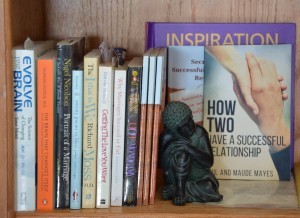Maude Mayes's Blog: Secrets of a Successful Relationship Revealed, page 99
June 15, 2016
Successful Relationships Reading Corner
This week’s blog asks if there is a better way than compromise. Our approach is quite different than most on this issue, but after searching, we found some great links for you.
Compromise: Is there an Alternative? “I hear a lot in the news these days about compromise. It always sounds so grudging: people giving up things they cherish in tiny installments, holding on for dear life, fighting furiously to let go of as little as possible. What a difficult way to think about life, as a nonstop holding battle. If I do this I have so little energy left to welcome what else life has to bring me.”
Never Compromise: 3 Steps to Synergy in Your Relationship “Compromise sounds great, in theory. At first glance, it is a way for you and your partner to “meet in the middle” and to find a resolution that you both can be okay with. But, in reality, compromise can feel like you lost or gave in. When you compromise, you are giving up what feels important to you and this doesn’t always foster a sense of connection and cooperation in your relationship.”
The next link is from Susan Heitler Ph.D., for whom we have great respect. We’re reading one of her books, The Power of Two, and highly recommend it.
Solve Tough Dilemmas With the Win-Win Waltz “Would you like to resolve all your conflicts without arguing? No more “My way!”, “No my way!” fights? Learn instead the three steps of the win-win waltz. The three steps of win-win waltzing help you to understand each other’s concerns instead of locking into adversarial positions. The more understanding you gain about both your and others’ deeply felt concerns, the more likely it becomes that you will be able to be nice to yourself and simultaneously nice also to others.”


June 12, 2016
Is There a Better Way Than Compromise?
 “We are always compromising, and I feel like I’m slowly giving up everything I want, just to have an agreement.”
“We are always compromising, and I feel like I’m slowly giving up everything I want, just to have an agreement.”
“We’ve gotten pretty good at finding compromises when we disagree, but I’m beginning to think I’m losing myself and my desires in this process.”
“The more we try to compromise, the further I feel we are getting from each other.”
In our interviews with couples, we have often heard these or similar refrains. Do you find yourself frequently fighting over decisions with your partner? Do you feel that you have to compromise to get any kind of resolution? Compromise can be a helpful tool for couples to find a way through their disagreements and arguments, those experiences of discord which arise as a result of there being two individuals looking for one decision or a single solution to a problem.
Compromise. Give a little, get a little. It’s the lubricant of relationships, the WD-40 that gets you unstuck. But let’s look at the price ticket. Someone lost out. There’s a feeling of deprivation, of being shorted. If the relationship is equitable, there’s an expectation that a favor is due on some future occasion. “You owe me one!” And these favors have to be priced. Is fixing the car worth more than doing the tax returns?
With compromise you're always giving something up in order to get something else #relationships
Click To Tweet
This is the difficulty with compromise; that you are always giving something up in order to get something else. Over time, this can build up and create a sense that you are not really ever getting what you want, leading to resentments, estrangement and a decrease in willingness to compromise.
We practice a very different form of resolution which, rather than slowly eroding our sense of union, strengthens and supports us as a couple. We have a process, outlined in our newest book “How Two: Have a Successful Relationship,” which relies on creating new solutions. This process emphasizes finding (actually creating together) mutual solutions, solutions which did not previously exist. These decisions and answers to problem solving are not the individual answers that either of us bring to the discussion. They are rather the result of the style and art of communication we employ in working this out together.
There are a number of factors that are involved in this type of creative problem solving:
Remember you’re on the same side.
That is, you’re together, you’re committed, you’re partners. You agree on certain things, whether they are external goals or mutual support.
Show empathy.
You need to, however imperfectly, imagine how your partner sees the situation, and to do that, you have to let go of your ego, you have to stop looking at your own needs for a moment. Sociopaths and some mentally ill people are unable to do this, but the rest of us can, and it’s a skill that can be developed over time.
Be open to other possibilities.
Surface wants are actually in service of deeper needs – security, hunger, variety. There are always alternatives that will fill those needs, and holding on to our first choice and insisting that it is the best and only solution is counterproductive.
Have a sense of adventure.
Treat these exchanges as an exciting opportunity to get close to your partner. The more you practice this, the more you will naturally feel this way.
Give this activity your full attention.
Make sure you are in a space where you can both focus fully on the issue. Make sure that you have enough time to allow answers to manifest without being interrupted.
Remain in physical contact whenever possible.
This simple action will greatly increase your sense of looking for mutual solutions.
Listen fully to each other.
This involves active listening, a practice of giving full attention to the speaker so their message is fully understood. This adds a mutuality to the exchange which supports creativity and a lack of defensiveness.
With these in place, you can make decisions and solve problems without either of you having compromised. Here’s a simple example.
Anne: I’d really like to see that Meryl Streep movie tonight.
Bert: Oh, it’s cold and drizzling, so I was imagining we would stay in and make love.
Anne: I was so swept away by the sex last night that I want it to stand by itself for a while. It feels almost sacrilegious not to leave a space for it.
Bert: I know what you mean about basking in the afterglow, and that’s why going outside on a cold night doesn’t appeal.
Anne: I really want to catch the movie before it leaves town. Perhaps we could go on Wednesday.
Bert: That would fit well with my schedule. But what about tonight?
Anne: Well, we could watch House of Cards.
Bert: Brr, too chilling a mood for this weather.
Anne: Oh, you’re looking for something cozy. How about popcorn, a glass of wine and Scrabble?
Bert: Ooh, we haven’t played that in ages. That sounds like fun!
Let’s look at why this worked so well.
Each person said what they wanted directly.
Each person responded to the other’s position: “It’s cold and drizzling.” “I want it to stand by itself for a while.”
Each person offered alternatives that would also work for them, and that seemed like they would work for the other person as well: “We could watch House of Cards.”
This process of exploration continued until they discovered something that worked for both of them: “Scrabble?” “That sounds like fun.”
The solution will almost always be different than either of the original ones. In this example, they created the new solution together and it worked for both of them. Neither had to give anything up.
Mutual solutions are those that have been created by the two of you together. They are not each of you giving up something. Instead, what has occurred is that you have both heard each other, and in a process of sharing, you have created something new that was actually not there before; a solution that fits both of your desires. This answer feels very exhilarating and is in many ways a birthing you two have shared. This process for making decisions and solving problems strengthens your union and leads to a great sense of peace and joy. Try this out the next time you are facing a decision, and you will be on the road to creating peace one relationship at a time!


June 8, 2016
Successful Relationships Reading Corner
This week’s blog was on how to improve your relationship with active listening, and here are some interesting articles about that:
How To Get Heard In Your Relationships: The Power Of Active Listening “There is nothing worse than not feeling heard. You’ve probably encountered a bad listener at a party, at work, or even in your personal life. It’s the person who continues to talk without pausing for you to get a word in, and when you do finally get the chance they don’t ask any follow-up questions because they probably didn’t even hear what you said.”
Practicing Active Listening Can Improve Your Relationship “Often partners are convinced that they are excellent listeners. However, when asked, many partners are unable to give an adequate summary of what their partner was saying. Partners aren’t always conscious of their tendency to plan what they are going to say next.”
How to Relearn Listening to Your Spouse “When you have been married for a long time, you may start to wonder what happened to the strong, communicative relationship you used to have. Perhaps you have endured too many fights and accusations that you don’t listen anymore. There are steps you can take to regain your ability and desire to listen to your spouse.”


June 5, 2016
How to Improve Your Relationship With Active Listening
 Often when asked about the important factors to relationship success, we mention active listening. Many people may not really understand what this is. In short, it’s how to really hear what the other person is saying. You might think you do that all the time already, but odds are you can do better. Active listening involves a number of components that make it a strong part of feeling accepted and appreciated in a relationship.
Often when asked about the important factors to relationship success, we mention active listening. Many people may not really understand what this is. In short, it’s how to really hear what the other person is saying. You might think you do that all the time already, but odds are you can do better. Active listening involves a number of components that make it a strong part of feeling accepted and appreciated in a relationship.
In any conversation, whether with your partner or a stranger, you need to listen to what they are saying from their standpoint, not from yours. Each person has their own interior life, just as detailed and intricate as our own, and though we can never enter entirely, we can peek inside. What they say is a window into their world, so accept the invitation to see inside, and look for your partner’s viewpoint. It’s not yours, and you’ll have to let go of your own viewpoint, your place, to find out and understand where they are at.
Active listening is a way to really hear what the other person is saying
Click To Tweet
Here’s some practical advice for doing so. Try to have conversations in a quiet place with no time pressure, because outside events reduce your ability to focus on what is being said. Don’t – this is really important – be preparing a response as you listen. Be open to other possibilities; don’t hear what is being said as incompatible with your position. This calls for empathy. The reality is that there are many choices and interpretations at every point in life; to assume that we have chosen the best and all others must be inferior is to ossify, freeze, become rigid – to be the very opposite of alive.
Allow the complete story to be told by not interrupting. Acknowledge what is being said, but don’t pull judgmental faces, as you risk skewing the narrative. Be present and listen to all the subtleties of what is being said as assiduously as you would seek clues in a mystery movie.
By following these steps in order, you will have the best chance of understanding your partner’s concerns.
Make Space
Choose an environment that is conducive to communicating, where you will not be interrupted and you can hear each other.
Be Interested
In order for your partner to feel like they can relax and really open up to you, they have to feel that you are actually interested in what they have to say.
Remember You Are Both on the Same Side
Relax and enjoy the exchange. You both want the best for each other.
Be Present
When your mate is speaking, be there, be present with your most loving and supportive energy. Let them feel how much you want to hear what they have to contribute.
Be Open to Different Thoughts and Ideas
The wonderful thing about being two different people is that you will hear ideas and suggestions that you would not come up with yourself. This can enrich your life in a deep way if you allow it.
Keep an Empty Mind
Listen without preparing an answer. Try not to be evaluating and judging what is being said. Let it filter into your awareness and allow new ideas to settle before processing the right and wrong of anything.
Do Not be in a Hurry
To truly listen to your partner, you cannot be aware of a time limit. Anything which takes your attention away from just hearing what is being communicated will interfere with this process.
Hearing your partner’s position fully lets you respond with empathy in a way that moves the conversation forward. We were interviewing a couple the other day, and they told us a story that is a great illustration of this approach.
Elisabeth really wanted to work out things with Bert about how they were going to handle their vacation plans. She asked him when he would have some time for them to figure out some things together. They picked a time when both were free and a place where they were uninterrupted and could hear each other. (There was no drama communicated with the request because they were both really relaxed when they talked about it.)
Elisabeth wanted to share how good she felt after the conversation.
“It was such a good exchange between us. I was able to tell Bert my ideas and concerns without getting interrupted. I could tell he was truly listening to what I had to say. His full attention was on me and what I was saying. He was warm and interested the whole time. It feels so great to be able to share and know the other person is really into hearing your ideas. It always makes me even more interested in what he has to say!”
Many authors define active listening as a two-stage process where the listener repeats back their understanding of what has been said. This is a great technique because it forces the listener to pay close attention to what is being expressed, and it tells the speaker the extent to which they have been heard and how well they have communicated. This is very useful, but in this blog post we have used the term in a more specific fashion and only discussed the listening aspect.
Practicing active listening is a wonderful way to turn every discussion into a source of intimacy and love. Feeling heard and acknowledged creates a profound sense of peace and warmth which will positively effect how you act in all other situations.
See also: You Can’t Talk and Listen at the Same Time


June 1, 2016
Successful Relationships Reading Corner
 This week’s blog was on balancing intimacy and individual time, and we have some good articles on that this week:
This week’s blog was on balancing intimacy and individual time, and we have some good articles on that this week:
Relationship Success: Balancing Togetherness and Individuality “A client of mine — during our initial consultation — said the following: “Here’s my issue. When I’m in a relationship, I invest so much of myself into maintaining romance and intimacy that I forget who I am as an individual. How can I balance my personal identity with my identity as a couple?”
Balancing Time Together vs. Apart “But if you think you want to try to have a happier, more satisfying experience of a relationship with another person, it might be worth considering: What kind of time do you need alone? What kind of time do you want together? How can you let the other person know what you need/want?”
Surprise! The REAL Secret To A Great Marriage … Is Time Alone “Stop the presses! We’ve discovered the most important ingredient of a successful marriage! And do you know what it is? The answer is . . . (drum roll, please) . . . alone time!”


May 29, 2016
How Important Is Individuality in a Successful Relationship?

“I want to love you without clutching, appreciate you without judging, join you without invading, invite you without demanding, leave you without guilt, criticize you without blaming, and help you without insulting. If I can have the same from you, then we can truly meet and enrich each other.” Virginia Satir
What makes a relationship really work? Are there common factors in successful relationships? We have been asking ourselves and numerous other couples these very questions for years. One thread that seems to be present in all the long term happy relationships that we have encountered is the aspect of individuality and how it plays a role with couples.
It seems that in the most fulfilled relationships, the partners have a deep commitment to sharing intimacy and personal time together where nothing else is occurring but being with each other, and at the same time they have strong individual lives. These couples support each other in developing their own personal growth and in being complete and separate individuals.
What goes into living in this way? One of the big components to this kind of relationship is total acceptance and trust. For your partner to be fully supportive toward your individual and separate life, they have to feel safe and open with you. They cannot have any fear or need to act defensively.
What is this kind of total acceptance? It means honoring the very real fact that your partner is a complete and separate individual and that this in no way lessens any aspect of your union. It involves understanding that even though your mate does things differently and expresses themselves differently, that you share the same core values and so these differences add to your life, they do not challenge it.
Acceptance of this nature will by its very definition eliminate most tendencies toward criticism and control. It also seems to minimize preconceptions and projections about your partner and leaves you both open to actually recognize what is happening in the shared present.
Total acceptance of your partner is a very freeing and strengthening behavior for both of you.
Click To Tweet
Total acceptance of your partner is a very freeing and strengthening behavior for both of you. It allows a rich fabric of shared experiences, ones that occur both together and apart, and by supporting each other in your own development, allows so much more to be fed into the shared time and intimacy of the relationship.
We believe that honoring each other’s individuality lays the ground work for many of the other elements we have found active within healthy and happy relationships. It can really be transformative to embrace this way of being together. It strongly reaffirms that you are both on the same side and leads you down the road of always seeking for mutual solutions. Try it and you will be astounded at the sense of peace and calm that it brings into your relationship.


May 25, 2016
Successful Relationships Reading Corner
This week’s blog was on alienation within your relationship, and what you can do about it. Some articles around that topic:
Rekindle Emotional Intimacy in Your Relationship “Emotional distance is one of the primary complaints of couples that come to my office for marriage counseling. While I think it’s normal for romantic love to wax and wane over time, it’s very uncomfortable to lose that loving feeling for your partner.”
Bridging Emotional Distance “Emotional distance in a relationship can feel like a descent into quicksand: slow and seemingly unstoppable…. Often, you can avoid sinkholes in your relationship merely by watching where you step. Know the communication styles that cause your partner to automatically tense up or withdraw.”
3 Signs Your Relationship is in Trouble “In all relationships there are ebbs and flows; times when you feel closer and times when you feel more distant. You may go through periods when things are going well, and then find yourselves stuck in conflicts and misunderstandings. Recognizing that there are problems is the first step toward finding out what you need to do “


May 22, 2016
Are You Feeling Alienation in Your Relationship?
 We all start out our relationships enamored of each other. We feel that magical connection and even experience the ecstasy of union. We usually become couples because of this bonding, full of the sense that we are on the same side, sharing love, caring and support.
We all start out our relationships enamored of each other. We feel that magical connection and even experience the ecstasy of union. We usually become couples because of this bonding, full of the sense that we are on the same side, sharing love, caring and support.
So, what happens to these wonderful beginnings? Sadly, many couples lose contact with this all important underpinning to their relationship. In the hustle and bustle of everyday life, sometimes due to lack of attention, but often coming from unhealthy relationship behaviors, they lose their initial connection and eventually become estranged from each other. Frequently a sense of distance, or even worse, the feeling of being adversaries develops.
If you are experiencing this in your relationship, do not despair. There really are a number of things that you can do about it. Two important factors in maintaining intimacy are openness and acceptance.
It is of paramount importance that you be open in your relationship. You have to show up, be there, expose yourself, or else your partner can’t see you, can’t understand you, can’t empathize. It’s easier to say than do, as we’ve all learned to hide ourselves, to fit in, to avoid ridicule, to protect ourselves. But in a close relationship, these layers have to go. Peel them off one at a time: take a risk, then another risk. You will be seen for who you are, something that makes all of us feel good and less defensive. The less you feel the need to defend yourself, the more you can both experience the pleasure of being together.
Another factor that renews relationship connections is total acceptance. For the initial intimacy to endure you need to accept your partner completely – all their weaknesses, foibles, quirks and habits. That’s who they are. You can’t change that (though you can bring lots of stress into a relationship by trying!) We assume that your core values match, so there are no aspects that are fundamentally unacceptable. Once that is the case, make sure that your partner knows that you accept them for who they are. Support their individuality and their personal growth and they will know you mean what you say. The more you both feel accepted in your individuality and not impinged upon by your partner, the closer you both will grow, paradoxical though that may seem. The more you show appreciation for who your partner is and the more you acknowledge them, the quicker you will experience the return of that wonderful closeness you once shared.
To make the move back to intimacy, you will need to make some changes, not in your mate but within yourself. What are the factors that are causing this disconnect? Have you become set in your ways? Do you keep score and make lists? Do you use language that is supportive or do you accuse and blame? There are many behaviors which drive people to feel they are on opposite sides instead of united on one side together. Realize that it is within your power to behave differently, and when you do, even small changes escalate and can produce amazing results. It only takes one of you to initiate different behavior that can have a strong positive influence on the relationship.
Are you and your partner living in the wrong time zone? We don’t mean that literally, but sometimes people are not in the same place, e.g. one person dwells on the past, their childhood or an earlier relationship. It is important to explore the factors from your past that influence how you relate. However, once recognized, they should be left in the past where they occurred. To truly find union with your partner, you both need to be in the present, experiencing what is actually happening together.
We’re not talking here about how to resolve problems or clear up misunderstandings. That is another topic. Here we are talking about renewing the bond between you, and with that strength, you can handle disagreements as partners, not adversaries. Reacquaint yourselves with each other. Start your adventure together with new fresh energy. The peace that arises when your relationship is a source of strength and not a battlefield will empower you in all of your life’s endeavors.


May 18, 2016
Successful Relationships Reading Corner
This week’s blog was on what you can take away from a breakup in order to improve your next relationship. We hope you enjoy these.
Breakups and new relationships offer opportunities to break old habits “New relationships also offer the opportunity to go down a different path and this is much easier to do when you have the self-awareness that comes with being willing to learn from the insights gained from your prior relationships. With each relationship you get to understand you a bit more and where you also need to step up for yourself to ensure that you’re representing your needs, expectations and wishes.”
People Who Go Through Painful Breakups End Up Stronger And Happier “It’s funny — they say that which does not kill you, makes you stronger. I don’t know if that statement can be applied more realistically to anything than a breakup. A number of studies indicate that we’re able to overcome such hardship and learn from those painful experiences in life, ultimately becoming stronger, healthier individuals.”
7 Surprising Lessons I Learnt from my Recent Breakup “Love isn’t enough. Your core values must align too. This was a difficult one for me to swallow. Love isn’t enough. If your core values don’t match, then it’s unlikely that the relationship will be successful.”


May 15, 2016
How Can Breakups Make For a Successful Relationship?
 Are you still in the dark times after a relationship breakup? Are you struggling with what happened or who did what? Do the echoes of your past relationship still come back to haunt you? These challenging times that we all face in the aftermath of a breakup can be the very source of a successful relationship.
Are you still in the dark times after a relationship breakup? Are you struggling with what happened or who did what? Do the echoes of your past relationship still come back to haunt you? These challenging times that we all face in the aftermath of a breakup can be the very source of a successful relationship.
You may ask “What do you mean? How can this be the source of anything good? I don’t want to feel this way!”
We know it’s hard to see anything positive at such a time, but these very times can be the fertile ground where you create the ingredients for a peaceful passionate relationship. This is an opportunity to review what occurred, not in terms of blame and guilt (which are never productive of anything), but rather in terms of getting to know yourself better, coming to understand what your core values actually are, and creating a personal understanding that will allow a relationship to flourish.
You may not see it in such a light, but there is a tremendous amount to learn from a failed relationship. The first reaction may only be pain, but the second response is usually the question why, and the initial response is usually blame – what the other person did or didn’t do. That’s an excellent way to remain stuck in the past and not take responsibility for any part of the separation. Instead, use what happened to learn what you do and don’t want from a relationship.
Finding your wants and needs is not easy for most people. We are all so influenced by society and other people that it is hard to recognize our authentic feelings. Below most desires are deeper desires, and so on. Sometimes ice cream is just ice cream, and sometimes it’s comfort, love and maternal nourishment. It is very important to distinguish real needs from surface needs, and looking at what was and wasn’t fulfilled in your relationship will help you make better choices in your next one.
Another lesson a previous relationship offers is an insight into your own behavior. You were probably told, repeatedly and in excruciating detail, what your failings were. Maybe they were real, maybe they were unreasonable, and maybe they came from your partner’s unfulfillable well of need. Listen carefully to yourself and you will hear which is which.
We often discuss The Spectrum of Acceptance, an approach that assists you in recognizing what is critically important to you and what isn’t. The first level of this spectrum is evaluating your core values.
“In the beginning of a relationship, evaluate your new partner in terms of your core values. You may encounter acts that, for you, are truly unacceptable – lying, cheating, withholding – whatever they may be, the deal-breakers vary from person to person. If you have truly reflected on what your deal breakers are, and find yours do not match your partner’s, this is a relationship that will not work, even when offset by sweeteners like sex or money. It’s hard in the beginning of a relationship to make this assessment, and it should not be done too precipitously. Allow time to get to know one another, and to experience what the other person’s values truly are. At the same time, be careful you are not swept away by the rush of a new relationship, and don’t ignore important information about deal breakers. Don’t think, either, that you’ll be able to fix them by changing the person. Be honest with yourself in this evaluation and if, after careful reflection, you find that your core values do not match, then trust your judgment. Get out.”
How Two: Have a Successful Relationship
The time of personal rawness after a separation offers possibilities not usually open to you. Use this for your own personal growth, and you will find that you are actually taking steps toward creating a successful relationship. Gather tools you can apply with this new awareness that will support positive changes in your behavior:
Use conscious methods of communication.
Remember both partners are on the same side.
Let go of needing to be right.
Don’t keep score.
Commit to creating mutual solutions.
Use the vulnerability created by your separation to your own advantage. Treat every failed relationship as a learning opportunity because this is how you grow and progress. You owe an immense debt to your previous love, so give thanks to your ex for the lessons learned. You are where you are because of where you’ve been.


Secrets of a Successful Relationship Revealed
We use this blog to continue the exploration of the magic that can be found in a relationship, and the wider implications of peace for the world. ...more
- Maude Mayes's profile
- 8 followers



